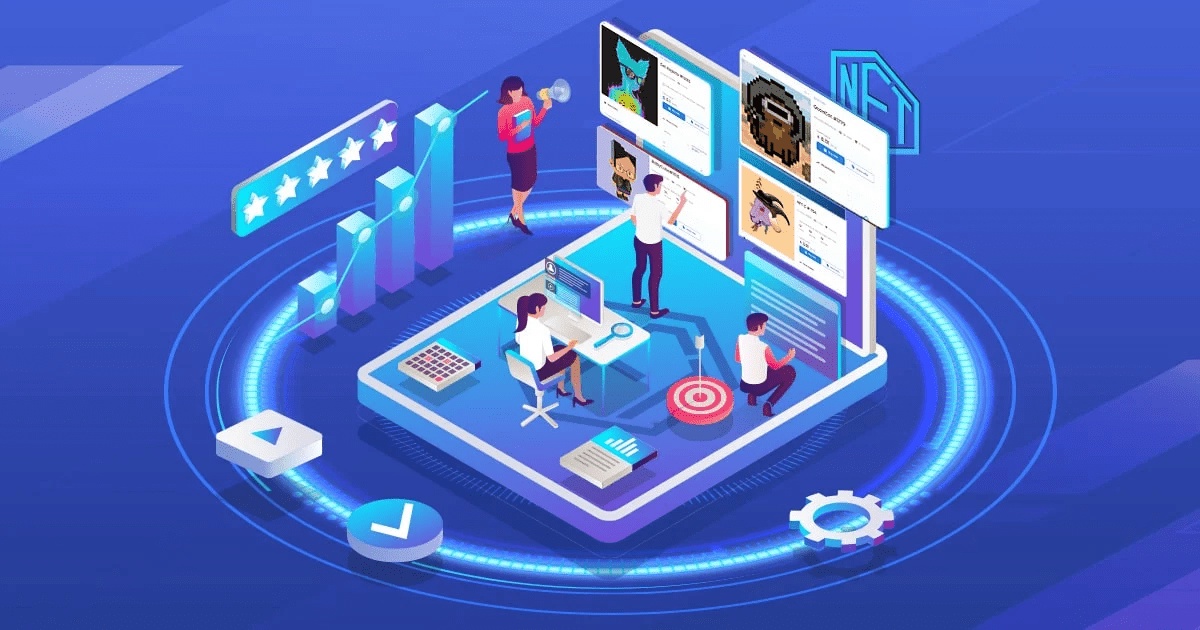In today's digital landscape, Non-Fungible Tokens (NFTs) have taken the world by storm, revolutionizing how we perceive ownership and authenticity in the digital realm. NFTs have paved the way for the creation of NFT marketplaces, where these unique digital assets are bought, sold, and traded. This comprehensive guide explores NFT marketplace development, shedding light on the process, key considerations, and future trends in this rapidly evolving domain.
Understanding NFTs and Their Significance
NFTs are unique digital tokens that represent ownership of a specific item or piece of content, often leveraging blockchain technology to ensure provenance and scarcity. This uniqueness has unlocked a new realm of possibilities in art, music, collectibles, virtual real estate, and even in-game assets.
Role of NFT Marketplaces in the Digital Economy
NFT marketplaces act as online platforms that facilitate the buying, selling, and trading of NFTs. They provide a space for creators to showcase their digital assets, and for buyers to discover and acquire these assets securely. This intersection of technology, creativity, and commerce has led to a vibrant NFT ecosystem.
Key Components of NFT Marketplace Development
- Smart Contracts
Smart contracts automate the process of NFT ownership transfer, ensuring that transactions are executed securely and without the need for intermediaries. These contracts are immutable, transparent, and tamper-proof.
- User Authentication and Security Measures
User security is paramount in NFT marketplaces. Implementing strong authentication methods and encryption safeguards the users' wallets and personal information.
- Intuitive User Interface and User Experience
A user-friendly interface is essential for seamless navigation and engagement. Intuitive design and easy-to-use features enhance the overall user experience.
- Integration of Cryptocurrency Wallets
NFTs are often bought with cryptocurrency. Integrating various cryptocurrency wallets simplifies the payment process and expands the user base.
Steps to Develop an NFT Marketplace
- Market Research and Ideation
Understanding the target audience and their preferences is crucial. Ideate on unique features that can set your marketplace apart.
- Choosing the Blockchain Platform
Select a suitable blockchain that aligns with your marketplace's goals. Ethereum, Binance Smart Chain, and Flow are popular choices.
- Smart Contract Development and Testing
Collaborate with blockchain developers to create and rigorously test smart contracts. Security audits ensure vulnerability-free code.
- Frontend and Backend Development
The marketplace's frontend should be visually appealing and easy to navigate. Backend development should support seamless transactions and user interactions.
- Testing and Quality Assurance
Thoroughly test the marketplace for bugs, glitches, and vulnerabilities. User feedback can be invaluable at this stage.
Future Trends in NFT Marketplace Development
- Interoperability of NFTs Across Blockchains
Cross-chain compatibility allows NFTs to move freely between different blockchain networks, enhancing liquidity and accessibility.
- Fractional Ownership of NFTs
Fractional ownership enables multiple users to invest in high-value NFTs, democratizing access to premium assets.
- Enhanced Gamification and Community Engagement
Gamified experiences within NFT marketplaces can boost user engagement and loyalty. Collectors can showcase their assets in creative ways.
- Integration of Virtual Reality and Augmented Reality
Bringing NFTs into virtual and augmented reality spaces adds a new dimension to ownership and display.
- Sustainability and Energy Efficiency
As NFTs gain popularity, the industry is exploring eco-friendly solutions to address concerns about energy consumption.
Monetization Strategies for NFT Marketplace Operators
- Listing Fees and Commissions
Charging fees for listing NFTs and taking a percentage from successful transactions are common revenue streams.
- Premium Features and Subscription Models
Offering premium features such as enhanced visibility or exclusive content can attract users willing to pay for added value.
- Governance Tokens and Decentralized Decision-Making
Issuing governance tokens empowers users to participate in platform decisions, fostering a sense of community ownership.
Legal and Regulatory Considerations
- Intellectual Property Rights and Licensing
Respecting creators' intellectual property rights and obtaining necessary licenses are essential to avoid legal disputes.
- Compliance with AML and KYC Regulations
Implementing Anti-Money Laundering (AML) and Know Your Customer (KYC) measures ensures regulatory compliance.
- Tax Implications of NFT Transactions
NFT transactions may have tax implications that vary by jurisdiction. Seeking professional advice is advised.
Challenges in NFT Marketplace Development
- Scalability and Network Congestion
High demand can strain blockchain networks, causing slow transactions and high fees. Solutions like layer-2 scaling are being explored.
- User Onboarding and Education
Educating users about NFTs, wallets, and the marketplace itself can overcome barriers to entry.
- Market Saturation and Quality Control
With numerous marketplaces and NFTs available, maintaining quality and standing out are ongoing challenges.
Conclusion
NFT marketplace development is a dynamic journey at the intersection of technology, creativity, and economics. As the NFT landscape continues to evolve, staying informed about trends, user needs, and regulatory developments is crucial for building successful and sustainable NFT marketplaces.


No comments yet